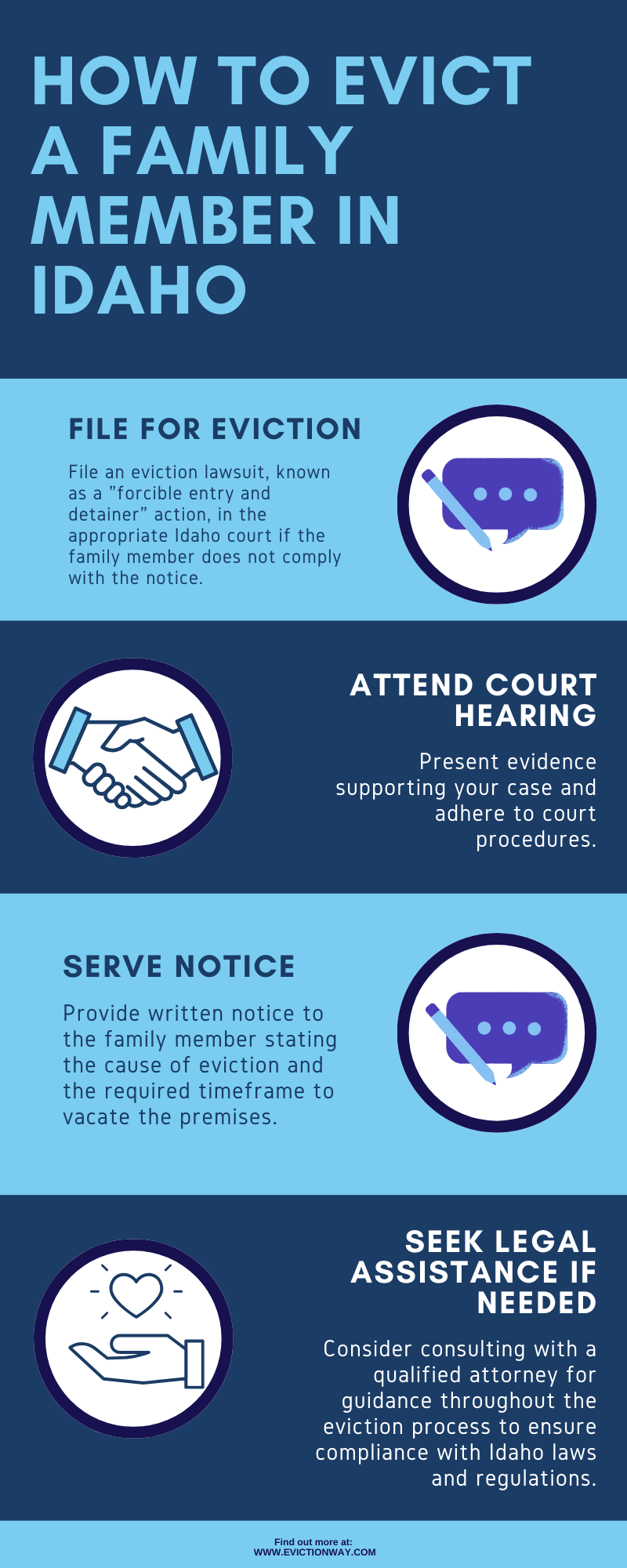Evicting a family member can be a difficult and emotional process, but it may be necessary to protect your rights and property. If you’re facing this situation in Idaho, this blog post will provide you with the information you need to proceed.
We’ll cover the legal steps involved in evicting a family member in Idaho, including how to serve them with an eviction notice and file for eviction in court. We’ll also provide tips on how to remove a family member politely and avoid unnecessary conflict.

It’s important to remember that the laws governing evictions can be complex, so it’s always advisable to consult with an attorney before taking any action. An attorney can help you understand your rights and responsibilities and ensure that you follow the proper legal procedures.
How To Evict a Family Member In Idaho
Evicting a family member can be a difficult and emotional process, but it is sometimes necessary to protect your rights and property. If you are considering evicting a family member in Idaho, it is important to understand the legal process and your rights as a landlord.
1. Give Notice
The first step in evicting a family member is to give them written notice to vacate the property. The notice must state the reason for the eviction and the date by which the family member must leave. The notice period varies depending on the reason for the eviction, but it is typically 30 days.
2. File a Complaint
If the family member does not vacate the property by the end of the notice period, you will need to file a complaint with the court. The complaint should state the reason for the eviction and the steps you have taken to resolve the issue.

3. Serve the Complaint
Once you have filed the complaint, you will need to serve it on the family member. The complaint can be served by a sheriff or a process server.
4. Attend the Hearing
After the complaint has been served, the court will schedule a hearing. At the hearing, you will have the opportunity to present your case and the family member will have the opportunity to present their defense.
5. Obtain a Judgment
If the court finds in your favor, it will issue a judgment of eviction. The judgment will order the family member to vacate the property by a certain date.
6. Enforce the Judgment
If the family member does not vacate the property by the date specified in the judgment, you can ask the court to enforce the judgment. The court may issue a writ of possession, which will authorize the sheriff to remove the family member from the property.
Additional Resources for Idaho eviction help:
Eviction notice Idaho
In Idaho, eviction notice indeed serves as a legal document that landlords can utilize when tenants breach their lease agreements.
This notice essentially notifies tenants that they rectify the violation or vacate the premises. It’s a crucial step in the eviction process and provides tenants with a final opportunity to resolve the issue before further legal action is taken.
You can download Eviction notice Idaho here.
How Much Does it Cost to Evict a Family Member in Idaho?
Evicting a family member can be a difficult and expensive process. The cost of eviction will vary depending on the specific circumstances of the case, but it can easily exceed $1,000.
In addition to the court costs, you will also need to pay for the services of a process server and a locksmith. If the eviction is contested, you may also need to pay for an attorney.
| Expense Category | Estimated Cost Range (USD) | Description |
|---|---|---|
| Filing Fee | $50 – $150 | The cost to file an eviction lawsuit with the local court. |
| Service Fee | $50 – $100 | Fee for the sheriff or process server to serve the eviction notice. |
| Attorney Fees | $400 – $5,000+ | Legal representation costs, which can vary based on case complexity and attorney rates. |
| Court Costs | $10 – $100 | Costs for additional legal procedures such as motions or further hearings. |
| Lost Rent | Varies | The potential income not being received during the eviction process. |
| Moving Costs | Varies | If the eviction includes removing the family member’s belongings, there will be additional costs. |
| Storage Fees | Varies | In the event that the belongings are stored, this would add to the expenses. |
| Lock Changing Fees | $50 – $200 | Costs to change locks to ensure premises security post-eviction. |
| Miscellaneous | Varies | Other costs such as property damage repair or cleaning might be necessary. |
- Filing fees: The filing fee for an eviction lawsuit in Idaho is $150.
- Service of process: The cost of serving the eviction notice to the tenant is typically between $50 and $100.
- Locksmith fees: If the tenant does not vacate the property voluntarily, you will need to hire a locksmith to change the locks. The cost of this service will vary depending on the locksmith’s rates.
- Attorney fees: If the eviction is contested, you may need to hire an attorney to represent you in court. The cost of an attorney will vary depending on their experience and the complexity of the case.

FAQs: Evicting a Family Member in Idaho
Here are some of the most frequently asked questions about evicting a family member in Idaho:
What are the grounds for evicting a family member in Idaho?
Idaho law allows landlords to evict family members for the same reasons they can evict any other tenant. These reasons include nonpayment of rent, violating the lease agreement, causing damage to the property, or engaging in criminal activity.
How do I start the eviction process in Idaho?
To start the eviction process, you must give your family member a written notice to vacate the property. The notice must state the reason for the eviction and the date by which your family member must leave. If your family member does not vacate the property by the deadline, you can file a complaint with the court.
What if my family member refuses to leave?
If your family member refuses to leave after you have filed a complaint with the court, the court will hold a hearing to determine whether or not to issue an eviction order. If the court issues an eviction order, your family member will be legally required to leave the property.

Can I evict a family member if they are not on the lease?
Yes, you can evict a family member even if they are not on the lease. However, you must be able to prove that the family member is a tenant and that they have violated the terms of the lease.
What is the shortest time for an eviction notice?
In Idaho, the shortest eviction notice period is three days for situations like non-payment of rent or material lease violations.
How long does a landlord have to give you to move out in Idaho?
The notice period a landlord must give in Idaho varies depending on the reason for eviction, ranging from three days to one month.
Can you be evicted for late fees in Idaho?
Yes, non-payment of rent, which includes late fees, can be grounds for eviction in Idaho if proper notice is given.
What are some tips for evicting a family member?
Here are some tips for evicting a family member:
- Document everything: Keep a record of all communications with your family member, including any notices to vacate and court filings.
- Be respectful: Even though you are evicting your family member, it is important to be respectful and professional throughout the process.
- Get legal help: If you are having difficulty evicting your family member, you may want to consider getting legal help.
Related:
